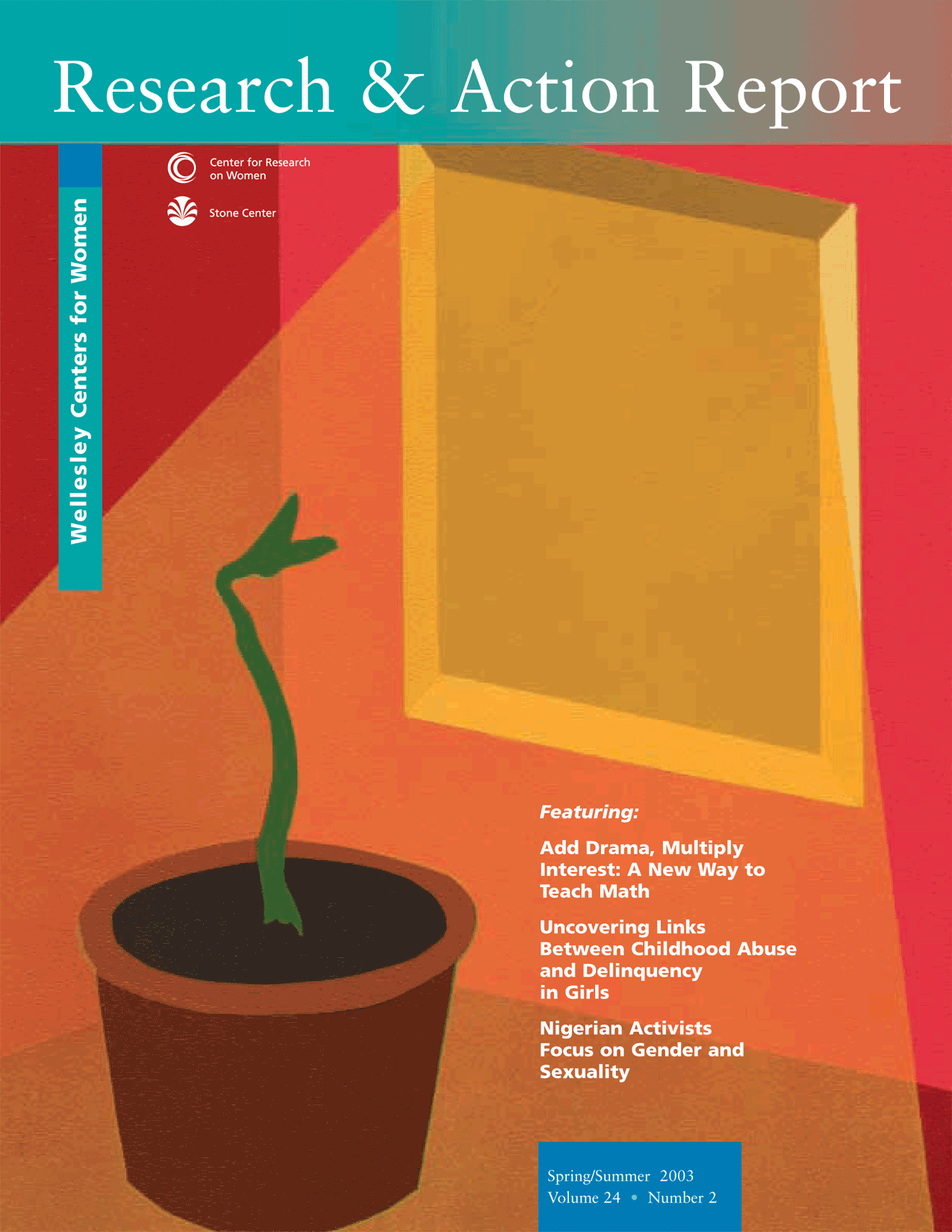Research & Action Report Spring/Summer 2003
Students are a vivid presence throughout the three buildings that house the Wellesley Centers for Women—at the copy machine, at computers, and at the reception desk. Each year, WCW hires approximately 70 students in a variety of clerical and research positions.
In addition, four endowed internships—two at the Stone Center and two at the Center for Research on Women—provide rich opportunities for students to dive into the world of research and to substantiate textbook learning with real-life lessons. “Students work on all projects—soup to nuts,” observes senior research scientist Sumru Erkut, who has worked with many young women at the Centers over the years. Students process data for studies, edit reports, write copy, help with events, contribute to the Centers’ public outreach efforts, answer phones, and generally make things happen. Students have co-presented at seminars and conferences and co-authored papers or journal articles with their senior mentors.
These young scholars are a vital part of life at the Centers and their experiences extend far beyond their employment on any single project. Vanessa Greene, who worked with senior research scientist Fern Marx from 1997 to 2001, puts it this way:“The more I worked, the more I began to learn about the research process and the various projects being undertaken at the Centers.” During her four years at Wellesley College, Greene was a key contributor to Marx’s research and a co-presenter at the WCW Luncheon Seminar, “The Cultivation and Practice
of Leadership.”
Marx, a dedicated mentor, observes: “At some level, the students are surrogate daughters (my own daughter is so far away). These amazing young women give me the opportunity to watch many of them grow and change over the course of several years. For me, a big part of the satisfaction is also sharing their life after college, writing letters of recommendation, going to their graduations, celebrating their life changes. They enrich my work through the insights they offer. I can truly say that they are colleagues in every way and that working with them is one of the key reasons I have stayed at the Centers. I see mentoring as a form of teaching. I work with students of different abilities, and it is exciting when I ask a student to do something she thinks she can‘t do, and then finds out she can.”
The students become part of the Centers‘ groundbreaking research and innovative programs and their mentors gain valuable new perspectives from a new generation of scholars. Building on her experience as one of the founders of the student group Organization for Mental Health Awareness, Morgan Wells, the Class of ’67 Intern at the Wellesley College Counseling Service, helps pull together student focus groups. “I feel that I offer a unique perspective since I understand the needs of students firsthand,” says Wells. Working as an intern has given her a rare look at the inner workings of the Counseling Service. “I understand now what inspires them to do what they do,” she says. “A major part of learning is just observing the process itself.”
“My work as an intern places classroom discussions of feminism within a real-world context, bridging the gap between theory and implementation,” comments Aishwarya Lakshmiratan, this year’s Linda Coyne Lloyd Student Research Intern. A senior majoring in economics, Lakshmiratan works with the Women’s Rights Network, collecting and summarizing 35 different genderbias studies. She is helping to prepare a comprehensive report card on the status of gender bias in the U.S. courts. “My internship,” says Lakshmiratan, “has introduced me to the U.S. legal system and is helping me understand how to make an impact on policy making.”
“I had no idea of the status of women around the world until I got involved with this work,” says JiaJing Liu, a political science major and the 2003 Shirley R. Sherr Student Research Intern. Working with Erkut, she is analyzing data on women leaders. Liu, a sophomore, notes: ”The extremely supportive environment and the opportunity to talk to an expert make a huge difference in my understanding of the issues.”
Along with learning practical skills such as data processing, analysis, and report writing, interns have a chance to learn valuable life skills. Oni Lusk-Stover, the 2003 Morse Fellow with Open Circle, the program that teaches young children to communicate their feelings in positive ways, says that her work in that program has helped her in her role as a resident advisor at Wellesley. “The internship has taught me more patience and made me realize that, in every situation, there are options from which I can choose. Now when students come to me with problems, I am able to react in a way that makes them more comfortable.”
At the end of each year, when students are asked to evaluate their experiences at WCW, their observations invariably reinforce the Centers’ commitment to bringing along the next generation of scholars. They observe that working at the Centers has helped them think critically about complex and difficult issues and acquire important time-management and research skills. They have gained experience in the nonprofit world and developed new career options. In addition, having a relationship with an adult who is not a professor is felt by many students to add a valuable dimension to their college experience.
“Watching all these talented, able, enthusiastic young women grow and learn is exhilarating,” says Kathryn Scott, administrative director of the Centers. “They come to us with widely different backgrounds and skills, all of which enrich and enlarge the WCW community. They are the future, and what they have learned here will influence society in large and small ways for years to come.”


